Electoral history of Justin Trudeau
This article is the Electoral history of Justin Trudeau, the twenty-third and current Prime Minister of Canada. Trudeau is currently serving two terms since November 4, 2015.
| ||
|---|---|---|
|
Prime Minister of Canada Policies Scandals and controversies Elections Common Ground 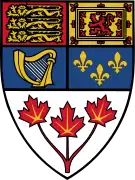 |
||
A liberal, Trudeau was successful in his first general election as leader of the Liberal Party, which he defeated then-Prime Minister Stephen Harper and the Conservatives in the general election of 2015 and formed a majority government. He was re-elected with a minority government in 2019.
Trudeau has stood for election to the House of Commons of Canada four times and was elected each time (2008, 2011, 2015, 2019).
Trudeau was elected leader of the Liberal Party in 2013, succeeding Michael Ignatieff, who retired from politics after losing the general election of 2011.
Summary
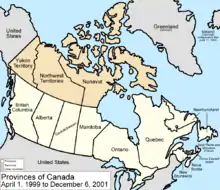
Trudeau currently ranks fourteenth out of twenty-three prime ministers for time in office, being in office for 5 years, 92 days.[1]
Trudeau is the eighth prime minister from Quebec, the others being Sir John Abbott, Sir Wilfrid Laurier, Louis St. Laurent, Pierre Trudeau, Brian Mulroney, Jean Chrétien and Paul Martin. He is also the fifth francophone prime minister, the others being Laurier, St. Laurent, Pierre Trudeau, and Chretien.
Trudeau was first elected to the House of Commons in 2008, at age 36. The Liberals were in opposition after the 2008 and 2011 general elections. Under Liberal leader Stéphane Dion, Trudeau was the Liberal critic for Citizenship and Immigration, Youth and Multiculturalism. The next leader, Michael Ignatieff, appointed him critic for Sports and Post-Secondary Education.[1][2]
In the 2011 general election, the Liberals under the leadership of Ignatieff were reduced to third party status, their worst showing in history. Ignatieff lost his own seat and retired from politics. Trudeau announced he would seek the party leadership. In the 2013 vote, he won the leadership on the first ballot with 80% support.[2]
Trudeau led the Liberals in the general election of 2015. At dissolution, the Liberals were in third place in the Commons, behind the Conservative Party, which held a majority government, and the New Democratic Party, which formed the Official Opposition. Trudeau led the Liberals to a majority government, defeating both the Conservatives led by Stephen Harper and the New Democrats led by Thomas Mulcair. Trudeau's government was sworn in on November 4, 2015.
Trudeau has stood for election to the Commons four times, in 2008, 2011, 2015 and 2019, all for the riding of Papineau. He has served in the House of Commons for 12 years, 113 days.[3]
Federal general elections: 2015 and 2019
Trudeau led the Liberal Party in two general elections. He won two (2015 and 2019). He won a majority government in the 2015 election, and then a minority in the 2019 election.
Federal general election, 2015
In the 2015 election, the Liberals under Trudeau came from third place in the Commons at dissolution to winning a majority government, defeating Prime Minister Harper.
| Party | Leaders | Seats Won | Popular Vote | |
|---|---|---|---|---|
| Liberal | Justin Trudeau1 | 184 | 39.47% | |
| Conservative | Stephen Harper2 | 99 | 31.9% | |
| New Democratic Party | Thomas Mulcair3 | 44 | 19.7% | |
| Bloc Québécois | Gilles Duceppe | 10 | 4.7% | |
| Green | Elizabeth May | 1 | 3.5% | |
| Total | 338 | 99.3%4 | ||
| Sources: Library of Parliament – History of Federal Ridings since 1867 | ||||
1 Leader of a third party when election was called; Prime Minister after election.
2 Prime Minister when election was called; Member of Parliament after the election.
3 Leader of the Opposition when election was called; leader of a third party after the election.
4 Table does not include parties which received votes but did not elect any members.
Federal general election, 2019
In the 2019 election, Trudeau was re-elected with a minority government, defeating the new Conservative leader, Andrew Scheer.
| Party | Leaders | Seats Won | Popular Vote | |
|---|---|---|---|---|
| Liberal | Justin Trudeau1 | 157 | 33.1% | |
| Conservative | Andrew Scheer2 | 121 | 34.4% | |
| Bloc Québécois | Yves-François Blanchet | 32 | 7.7% | |
| New Democratic Party | Jagmeet Singh | 24 | 15.9% | |
| Green | Elizabeth May | 3 | 6.5% | |
| Independent | 1 | 0.4% | ||
| Total | 338 | 98.0%3 | ||
| Sources: Elections Canada: October 21, 2019 Federal Election - Election Results | ||||
1 Prime Minister when election was called; Prime Minister after election.
2 Leader of the Opposition when election was called; Leader of the Opposition after the election.
3 Table does not include parties which received votes but did not elect any members.
Federal constituency elections: 2008 to 2019
Trudeau has stood for election to the House of Commons four times, in 2008, 2011, 2015 and 2019, all for the riding of Papineau. He was elected the first four times.
2008 Federal Election: Papineau
| Party | Candidate | Popular Vote | % | |
|---|---|---|---|---|
| Liberal | 17,724 | 41.5% | ||
| Bloc Québécois | X Vivian Barbot | 16,535 | 38.7% | |
| New Democratic Party | Costa Zafiropoulos | 3,734 | 8.7% | |
| Conservative | Mustaque Sarker | 3,262 | 7.6% | |
| Green | Ingrid Hein | 1,213 | 2.8% | |
| Independent | Mahmoud Raza Baig | 267 | 0.6% | |
| Total | 42,735 | 99.9%1 | ||
| Source: Library of Parliament – History of Federal Ridings since 1867: Papineau | ||||
![]() Elected.
Elected.
X Incumbent.
1 Rounding error.
2011 Federal Election: Papineau
| Party | Candidate | Popular Vote | % | |
|---|---|---|---|---|
| Liberal | 16,429 | 38.4% | ||
| New Democratic Party | Marcos Radomes Tejada | 12,102 | 28.3% | |
| Bloc Québécois | Vivian Barbot | 11,091 | 25.9% | |
| Conservative | Shama Chopra | 2,021 | 4.7% | |
| Green | Danny Polifroni | 806 | 1.9% | |
| Marxist–Leninist | Peter Macrisopoulos | 228 | 0.5% | |
| Non-affiliated | Joseph Young | 95 | 0.2% | |
| Total | 42,772 | 99.9%1 | ||
| Source: Library of Parliament – History of Federal Ridings since 1867: Papineau | ||||
![]() Elected.
Elected.
X Incumbent.
1 Rounding error.
2015 Federal Election: Papineau
| Party | Candidate | Popular Vote | % | |
|---|---|---|---|---|
| Liberal | 26,391 | 52.0% | ||
| New Democratic Party | Anne Lagacé Dowson | 13,132 | 25.9% | |
| Bloc Québécois | Maxime Claveau | 6,182 | 12.2% | |
| Conservative | Yvon Vadnais | 2,390 | 4.7% | |
| Green | Danny Polifroni | 1,443 | 2.8% | |
| Independent | Chris Lloyd | 505 | 1.0% | |
| Rhinoceros | Tommy Gaudet | 323 | 0.6% | |
| Independent | Kim Waldron | 159 | 0.3% | |
| Marxist–Leninist | Peter Macrisopoulos | 142 | 0.3% | |
| Non-affiliated | Beverly Bernardo | 103 | 0.2% | |
| Total | 50,770 | 100.0% | ||
| Source: Library of Parliament – History of Federal Ridings since 1867: Papineau | ||||
![]() Elected.
Elected.
X Incumbent.
2019 Federal Election: Papineau
Trudeau was re-elected in the 2019 general election.
| Party | Candidate | Popular Vote | % | |
|---|---|---|---|---|
| Liberal | 24,797 | 51.2% | ||
| New Democratic | Christine Paré | 9,135 | 18.9% | |
| Bloc Québécois | Christian Gagnon | 7,722 | 15.9% | |
| Green | Juan Vazquez | 3,673 | 7.6% | |
| Conservative | Sophie Veilleux | 2,095 | 4.3% | |
| Rhinoceros | Jean-Patrick Cacereco Berthiaume | 334 | 0.7% | |
| People's | Mark Sibthorpe | 311 | 0.6% | |
| Christian Heritage | Susanne Lefebvre | 184 | 0.4% | |
| No affiliation | Luc Lupien | 73 | 0.2% | |
| Independent | Alain Magnan | 73 | 0.2% | |
| No affiliation | Steve Penner | 54 | 0.1% | |
| Total | 48,451 | 100.1%1 | ||
| Source: Elections Canada - October 21, 2019 Federal Election - Election Results - Papineau | ||||
![]() Elected.
Elected.
X Incumbent.
1 Rounding error.
2013 Liberal Party leadership election
Following the 2011 general election, the leader of the Liberals, Michael Ignatieff, announced his retirement. Trudeau entered the leadership contest, which was held in April, 2013. The vote was based on the 308 Liberal riding associations, which each had 100 points. All members of the party had the right to vote in the election through their riding associations. The points for each riding association were allocated in proportion to the local vote.
| Candidate | Votes cast | Points won | |||
|---|---|---|---|---|---|
.jpg.webp) |
Justin Trudeau | 81,389 | 78.8% | 24,668 | 80.1% |
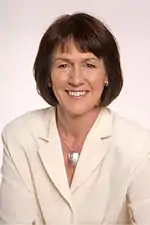 |
Joyce Murray | 12,148 | 11.8% | 3,130 | 10.2% |
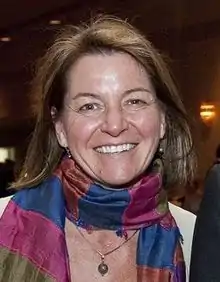 |
Martha Hall Findlay | 6,585 | 6.4% | 1,760 | 5.7% |
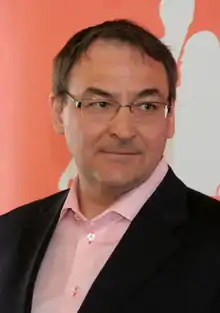 |
Martin Cauchon | 1,630 | 1.6% | 815 | 2.6% |
 |
Deborah Coyne | 833 | 0.8% | 214 | 0.7% |
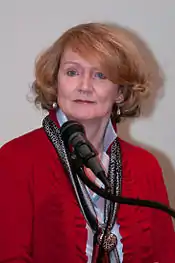 |
Karen McCrimmon | 757 | 0.7% | 210 | 0.7% |
| Total | 103,342 | 100.1%1 | 30,797 | 100.0% | |
| Sources: Huffington Post: Justin Trudeau Wins Liberal Leadership Race In Resounding Fashion; Globe & Mail: Justin Trudeau elected Liberal leader in a landslide. | |||||
1 Rounding error.
See also
- Electoral history of Stephen Harper - Trudeau's predecessor as Prime Minister.
.jpg.webp)